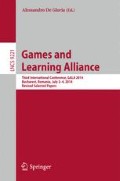Abstract
Research in Serious Games (SG), as a whole, faces two main challenges in understanding the transition between the instructional design and actual game design implementation and documenting an evidence-based mapping of game design patterns onto relevant pedagogical patterns. From a practical perspective, this transition lacks methodology and requires a leap of faith from a prospective customer in the ability of a SG developer to deliver a game that will achieve the desired learning outcomes. A series of workshops were thus conducted to present and apply a preliminary exposition though a purpose-processing methodology to probe various SG design aspects, in particular how serious game design patterns map with pedagogical practices. The objective was to encourage dialogue and debate on core assumptions and emerging challenges to help develop robust methods and strategies to better SG design and its interconnectedness with pedagogy.
Access this chapter
Tax calculation will be finalised at checkout
Purchases are for personal use only
References
Suttie, N., Louchart, S., Lim, T., Macvean, A., Westera, W., Brown, D., Djaouti, D.: Introducing the “serious games mechanics” a theoretical framework to analyse relationships between “game” and “pedagogical aspects” of serious games. Procedia Comput. Sci. 15, 314–315 (2012)
Arnab, S., Berta, R., Earp, J., De Freitas, S., Popescu, M., Romero, M., Usart, M.: Framing the adoption of serious games in formal education. Electron. J. e-Learn. 10(2), 159–171 (2012)
Lim, T., Louchart, S., Suttie, N., Hauge, J.B., Stanescu, I.A., Ortiz, I.M., Moreno-Ger, P., Bellotti, F., Carvalho, M.B., Earp, J., Ott, M., Arnab, S., Berta, R.: Narrative serious game mechanics (NSGM) – insights into the narrative-pedagogical mechanism. In: Göbel, S., Wiemeyer, J. (eds.) GameDays 2014. LNCS, vol. 8395, pp. 23–34. Springer, Heidelberg (2014)
Lim, T., Louchart, S., Suttie, N., Hauge, J.B., Stanescu, I.A., Bellotti, F., Carvalho, M.B., Earp, J., Ott, M., Arnab, S., Brown, D.: Serious game mechanics, workshop on the ludo-pedagogical mechanism. In: Göbel, S., Wiemeyer, J. (eds.) GameDays 2014. LNCS, vol. 8395, pp. 186–189. Springer, Heidelberg (2014)
Games and Learning Alliance conference (GALA) (2014). http://www.galaconf.org/2014/
Baalsrud-Hauge, J., Lim, T., Louchart, S., Stanescu, I.A., Ma, M., Marsh, T.: Game mechanics supporting pervasive learning and experience in games, serious games, and interactive & social media. In: The 14th International Conference on Entertainment Computing (ICEC) (2015). http://icec2015.idi.ntnu.no/?page_id=19
Rogers, Y., Muller, H.: A framework for designing sensor-based interactions to promote exploration and reflection in play. Int. J. Hum Comput Stud. 64(1), 1–14 (2006). doi:10.1016/j.ijhcs.2005.05.004
Good, J., Robertson, J.: CARSS: a framework for learner-centred design with children. Int. J. Artif. Intell. Educ. 16(4), 381–413 (2006)
Bjork, S., Holopainen, J.: Games and design patterns. In: Salen, K., Zimmerman, E. (eds.) The Game Design Reader, pp. 410–437. MIT Press, Cambridge (2006)
Kelle, S., Klemke, R., Specht, M.: Design patterns for learning games. IJTEL 3(6), 555–569 (2011)
Karagiorgi, Y., Symeou, L.: Translating constructivism into instructional design: potential and limitations. Educ. Tech. Soc. 8(1), 17–27 (2005)
Marfisi-Schottman, I., Labat, J.M., Carron, T.: Building on the case teaching method to generate learning games relevant to numerous educational fields. In: 2013 IEEE 13th International Conference on Advanced Learning Technologies (ICALT), pp. 156–160, July 2013
Djaouti, D., Alvarez, J., Jessel, J.P., Methel, G., Molinier, P.: A gameplay definition through videogame classification. Int. J. Comput. Games Technol. 2008, 4 (2008). doi:10.1155/2008/470350
Acknowledgments
This project is partially funded under the European Community Seventh Framework Programme (FP7/2007 2013), Grant Agreement nr. 258169 and EPSRC/IMRC grants 113946 and 112430.
Author information
Authors and Affiliations
Corresponding author
Editor information
Editors and Affiliations
Rights and permissions
Copyright information
© 2015 Springer International Publishing Switzerland
About this paper
Cite this paper
Lim, T. et al. (2015). Serious Game Mechanics, Workshop on the Ludo-Pedagogical Mechanism. In: De Gloria, A. (eds) Games and Learning Alliance. GALA 2014. Lecture Notes in Computer Science(), vol 9221. Springer, Cham. https://doi.org/10.1007/978-3-319-22960-7_17
Download citation
DOI: https://doi.org/10.1007/978-3-319-22960-7_17
Published:
Publisher Name: Springer, Cham
Print ISBN: 978-3-319-22959-1
Online ISBN: 978-3-319-22960-7
eBook Packages: Computer ScienceComputer Science (R0)

